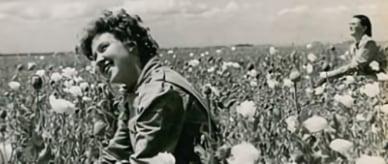One of the biggest nightlife trends of the past decade has been the rise of 'speakeasy' or 'prohibition' bars.
Evoking the illicit glamour of the 1920s and 1930s, they often boast secret entrances and an extensive cocktail menu.
This speakeasy chic references a dramatic period in American social history – the prohibition era. From 1920 to 1933, it was illegal to manufacture or sell alcohol across the United States, except for special circumstances such as medical or religious purposes.
As a result, a huge underground market developed for unlawful alcohol, often of inferior quality, with the poor taste disguised by inventive cocktail recipes. A massive criminal network also emerged to produce and supply beer, wine and spirits. This lucrative 'bootlegging' trade led to major gang wars and vigorous policing by the US Federal Bureau of Investigation.
Prohibition in Canberra
Despite a long-standing local temperance movement, Australia never introduced prohibition laws – with one exception.
From 1911 until 1928, new liquor licences were banned in the Federal Capital Territory (later renamed the Australian Capital Territory). But since alcohol could still legally be brought across the border from New South Wales, there was little incentive to establish illicit bars in Canberra.
Even so, from 1901 the Commonwealth Government had been vitally interested in the illegal manufacture and sale of alcohol. At Federation the responsibility for customs and excise passed from the former colonies to the new Department of Trade and Customs, which was governed by national legislation including the Distillation Act, the Excise Act and the Beer Excise Act.
Raids and duties
In May 1934, a series of raids saw Commonwealth customs officials and local police swooping on pubs in Lithgow, Cullen Bullen, Rydal and Bathurst in New South Wales.
Seizing over 27,000 litres of beer in barrels and bottles, they were investigating what the Lithgow Mercury newspaper described as 'the biggest frauds of their kind in the history of the State'.
As revealed in the Excise Branch prosecution register for NSW, four publicans and Lithgow’s Zig-Zag Brewery were charged under section 43 of the Beer Excise Act. The law decreed that 'No person shall remove or receive from any brewery … any beer in respect of which the duty has not been paid'.
Legally, brewers owed the government a duty of 1 shilling and 9 pence for each gallon (4.5 litres) of beer they produced. Payment was indicated by an excise stamp attached to every barrel sold.
When the streets ran with beer
Prosecuted in the Lithgow Court, the Commonwealth's case rested on the investigations of excise officer James Maher. He revealed that since March 1934, the Zig-Zag Brewery had been selling beer without the required excise stamp – and without paying duty. Managing director Vallick Mallon had convinced publicans to accept the alcohol at a discount, claiming that excise payments would be 'fixed up' later. Instead, he kept a secret book of unstamped beer sales.
Some publicans protested their innocence, while others admitted that they had knowingly bought and served illicit beer. Supplies were confiscated from the Alexandria Hotel in Rydal, the Royal Hotel in Cullen Bullen, and the Workmen's Club, Imperial Hotel and Lithgow Hotel in Lithgow, plus several Bathurst pubs. After the licensees paid fines ranging from 12 to 34 pounds, police poured thousands of litres of confiscated beer down the gutters of Bathurst and Lithgow.
When Mallon failed to appear in court, the Zig Zag Brewery was found liable for nearly 574 pounds in unpaid excise and 253 pounds in fines and costs. But the devious manager avoided payment yet again – by the end of the year the prosecutions register noted that his penalties had been 'treated as irrecoverable and written off'.






